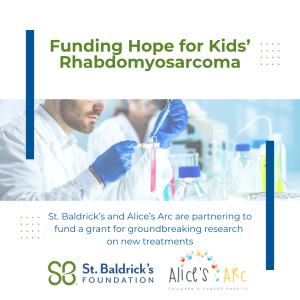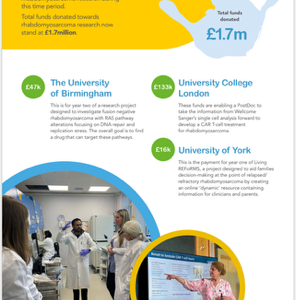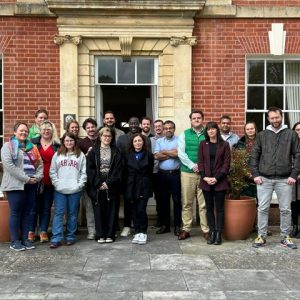Support from Alice’s Arc is enabling the team to move their research forward. Here are some of the recent achievements that Alice’s Arc has helped to make possible:
The development of two further patient derived pre-clinical models of rhabdomyosarcoma.
Preclinical testing of a drug that inhibits an enzyme called PARP (Poly-(ADP-ribose) polymerase). The team has established that these drugs can make rhabdomyosarcoma cells more sensitive to irradiation treatment. The team is quantifying how effective different dose levels of the drug are when combined with radiation. They are also exploring the associated molecular mechanisms that explain this sensitivity with the aim of exploiting this further. These experiments are taking place in rhabdomyosarcoma cells grown in 3D spheres. These spheres – compared to cells grown in flat layers in petri dishes – better mimic how rhabdomyosarcoma cells behave in the body.
Planning of in vivo preclinical testing of the drug in collaboration with a drug company. This includes the testing of tumour cells and bloods to establish biomarkers to assess the effects the treatment is having.
In parallel, an additional promising drug has also been tested. A drug inhibiting the molecular target PLK1 (polo-like kinase1) has now been combined with the ‘backbone therapy’ vincristine and irinotecan (VI) in our models. This supports the potential for introduction of this combination into early clinical trials and/or the new international trial for rhabdomyosarcoma patients called FaR-RMS (Frontline and Relapse RhabdoMyoSarcoma)
The team is involved in a collaborative study with the US, determining the frequency of genetic mutations in rhabdomyosarcoma cells that may provide new therapeutic targets. The team made a significant contribution to the design of the panel used to assay the mutations and to sample collection/preparation.
Next Steps
The team will execute the in vivo testing and mechanistic studies that have been planned and will prepare research findings for publication.
A cooperative pilot study testing circulating tumour DNA (ctDNA) is also planned based on samples of blood that the team and other labs in Europe have been carefully collecting. The aim is to be able to identify and quantify traces of tumour DNA in the blood of rhabdomyosarcoma patients and show that this may be useful in monitoring tumour burden/responses to treatments in patients. The researchers anticipate that success in the pilot study will be rolled out for further testing in the new clinical trial for rhabdomyosarcoma (FaR-RMS).
Key findings will be translated forward clinically into trials through national and European groups, namely, NCRI (National Cancer Research Institute), EpSSG (European paediatric soft tissue Sarcoma Study Group) and ITCC (Innovative Therapies for Childhood Cancers).




